 Continuing with a series digging into the names of the characters from Christopher Nolan's film Inception, I have struggled in my research behind the meaning of Joseph Gordon-Levitt's character Arthur.
Continuing with a series digging into the names of the characters from Christopher Nolan's film Inception, I have struggled in my research behind the meaning of Joseph Gordon-Levitt's character Arthur. I've looked to see if anyone is talking about this character name and have been unimpressed with the one or two analysis' that flippantly throw out the idea that the Arthur character could be referencing King Arthur of the classic legend.
Sure King Arthur was a leader, as the Inception character Arthur also is in many ways, but where the film Arthur leads in subtly as the point man, the King Arthur leads out of title, strength, and clear authority. Additionally, I just have a hard time finding a connection between these two characters.
In fact, as I've researched for some time I've discovered other potential name sakes, such as Arthur Honneger the composer who's steam train musical score, and associated video, Pacific 231, certainly has a connection to a train motif in the film. But like King Arthur, Honneger's score and film are not enough of a connection.
Arthur C. Clarke
Instead, I think the character Arthur pays homage to novelist and scientist Arthur C. Clarke (pictured above).
Clarke's fame stretches from writing sci-fi classics like 2001: A Space Odyssey; non-fiction science writing like The Exploration Of Space; his Nobel Peace Prize nominations; his work influencing the name of space craft; and an Oscar nomination shared with Stanley Kubrick.
Arthur C. Clarke seems just like the type of person that Nolan would want to memorialize in the form a character in the film, largely for his creativity when it came to his writing about the future, technology, consequences and rules associated with the dynamic nature of progress, and a boundless universe.
Beyond general themes there are two of Clarke's works I believe are worth mentioning.
2001: A Space Odyssey
 2001: A Space Odyssey
2001: A Space OdysseyOne of the qualities of this film and story is that I find it's vagueness and open ended nature and gaps similar in style i n many ways to those we find in the film Inception. Granted, the pacing is quite different the discussions and thoughts are not.
n many ways to those we find in the film Inception. Granted, the pacing is quite different the discussions and thoughts are not.
 n many ways to those we find in the film Inception. Granted, the pacing is quite different the discussions and thoughts are not.
n many ways to those we find in the film Inception. Granted, the pacing is quite different the discussions and thoughts are not.Additionally, there are certain images from 2001 and Inception that I personally find quite similar. One is the hibernation that the characters undergo in 2001 as they travel to their destination seems like a very similar image to the travelers that are sleeping in there dream states.
Similarly, in the dream that takes place in the hotel, which is truly the playground for the Arthur character's best scenes, there is such a similar feeling to me between the floating gravitational feel of 2001. Particularly the way the Kubrick film portrays zero gravity seems very similar, particularly some of the cinematic views in this film (as pictured, right). The famous floating pen scene comes to mind as well from the film with the Blue Danube Waltz playing in the background.
It is these connections, that I feel like make Joseph Gordon-Levitt's character most appropriately named after Arthur C. Clarke.
The Light of Other Days
In the year 2000, Arthur C. Clarke's last novel The Light of Other Days co-authored with Stephen Baxter came out.
I think in sharing some plot details some very strong connections and inspirations for Inception could become clear.
The Light of Other Days deals with worm hole technology that allows light waves to be used to get into other people's minds, spying on people and their most internal and secret thoughts, eliminating privacy and allowing people to get into people's minds to know anything. While the book allows for the space-time continuum to be breached so that time can be explored into the far past, the concept of getting into someones minds and knowing their secrets is obviously a big part of Inception, and Leonardo DiCaprio's character as an extractor. Nolan used dreams instead of worm holes.
The main characters of Clarke's final novel bear some strong similarities to Robert and Maurice Fischer and their relationship. First off, the main character Hiram Patterson is the CEO of an Energy Company who's goal is to monopolize the energy industry by using his light ray technology to find the collective energy history of the world. Remember, Maurice Fischer, like this character Hiram, was also the CEO of an energy company.
The interpersonal relationship in the story largely focuses on his relationship with his son Bobby who in many ways is manipulated (scientifically and socially) in order to form his son into the perfect heir to take over his energy company. This connection with the plot element of Inception is certainly very clear to those who have viewed the film (it may also be another reason for using the name Robert, which could be shortened to Bobby, in the film for Robert Fischer Jr.)
 Is Arthur's character in Inception named after Arthur C. Clarke? While I have not seen that theory proposed elsewhere, I can't imagine any better connection. Not only does this seem intentional, it seems particularly relevant to Gordon-Levitt's character and this story.
Is Arthur's character in Inception named after Arthur C. Clarke? While I have not seen that theory proposed elsewhere, I can't imagine any better connection. Not only does this seem intentional, it seems particularly relevant to Gordon-Levitt's character and this story.
 Nolan's reach and creativity in creating playful references in the character names in Inception is quite enjoyable. Like
Nolan's reach and creativity in creating playful references in the character names in Inception is quite enjoyable. Like 


 Cillian Murphy as Robert Fischer Jr., Energy Heir and 'The Mark'
Cillian Murphy as Robert Fischer Jr., Energy Heir and 'The Mark' I have a hard time believing that Christopher Nolan would place such an obviously connected name like Ariadne into his film, and not have meanings and connections associated with the other bizarre names chosen in this film. Although, perhaps the connections are not quite as clear.
I have a hard time believing that Christopher Nolan would place such an obviously connected name like Ariadne into his film, and not have meanings and connections associated with the other bizarre names chosen in this film. Although, perhaps the connections are not quite as clear.
 If Colonel Saito is the one who is driving the mission and pushing the schedule to make sure that the bridge get's built, Inception's Saito is the same unstoppable driver in this film as well.
If Colonel Saito is the one who is driving the mission and pushing the schedule to make sure that the bridge get's built, Inception's Saito is the same unstoppable driver in this film as well. Ariadne is certainly a unique name for a character, and the choosing of this name for Ellen Page's character is no accident.
Ariadne is certainly a unique name for a character, and the choosing of this name for Ellen Page's character is no accident.
 The story of Inception has it's own mazes and paradoxical questions, but it is clear that this character naming was a excellent play on mythology to give one of my
The story of Inception has it's own mazes and paradoxical questions, but it is clear that this character naming was a excellent play on mythology to give one of my 
















 Here's the premise of my thought, you're probably thinking why is this guy blogging about this film that came out almost two years ago. I've actually seen it a couple times and today suddenly have something to say about the film.
Here's the premise of my thought, you're probably thinking why is this guy blogging about this film that came out almost two years ago. I've actually seen it a couple times and today suddenly have something to say about the film.
